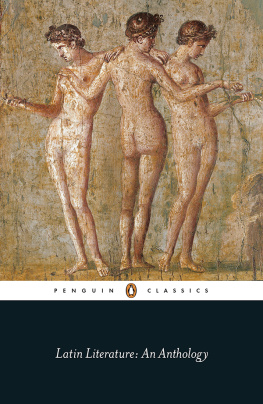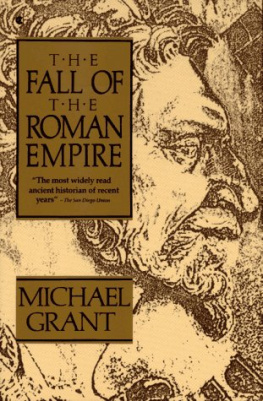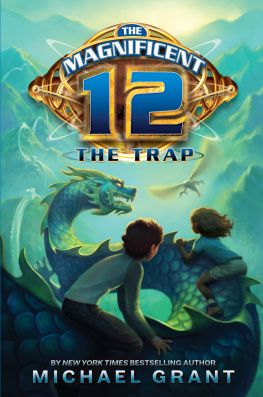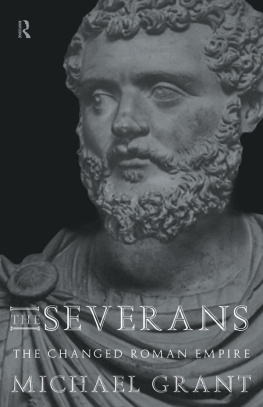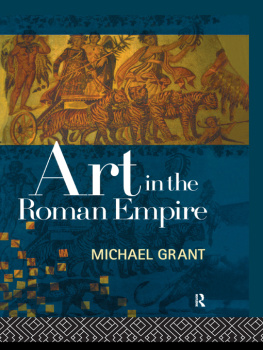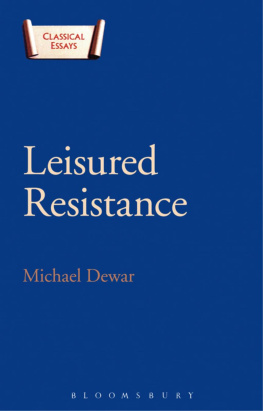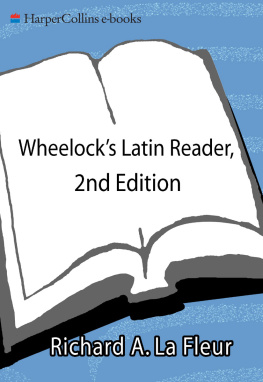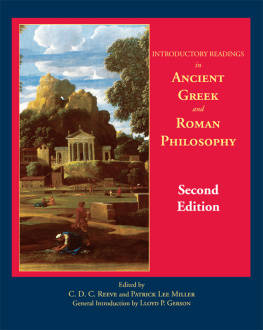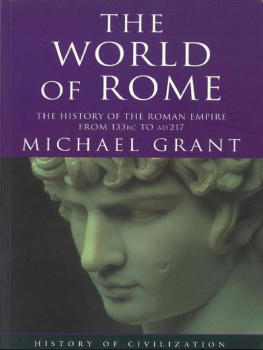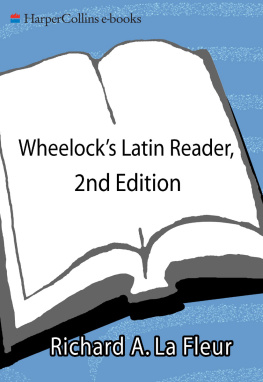Michael Grant - Latin Literature: An Anthology
Here you can read online Michael Grant - Latin Literature: An Anthology full text of the book (entire story) in english for free. Download pdf and epub, get meaning, cover and reviews about this ebook. year: 2015, publisher: Penguin Classics, genre: Art. Description of the work, (preface) as well as reviews are available. Best literature library LitArk.com created for fans of good reading and offers a wide selection of genres:
Romance novel
Science fiction
Adventure
Detective
Science
History
Home and family
Prose
Art
Politics
Computer
Non-fiction
Religion
Business
Children
Humor
Choose a favorite category and find really read worthwhile books. Enjoy immersion in the world of imagination, feel the emotions of the characters or learn something new for yourself, make an fascinating discovery.
- Book:Latin Literature: An Anthology
- Author:
- Publisher:Penguin Classics
- Genre:
- Year:2015
- Rating:4 / 5
- Favourites:Add to favourites
- Your mark:
- 80
- 1
- 2
- 3
- 4
- 5
Latin Literature: An Anthology: summary, description and annotation
We offer to read an annotation, description, summary or preface (depends on what the author of the book "Latin Literature: An Anthology" wrote himself). If you haven't found the necessary information about the book — write in the comments, we will try to find it.
Latin Literature: An Anthology — read online for free the complete book (whole text) full work
Below is the text of the book, divided by pages. System saving the place of the last page read, allows you to conveniently read the book "Latin Literature: An Anthology" online for free, without having to search again every time where you left off. Put a bookmark, and you can go to the page where you finished reading at any time.
Font size:
Interval:
Bookmark:


Latin Prose and Poetry
Michael Grant

PENGUIN CLASSICS
UK | USA | Canada | Ireland | Australia
India | New Zealand | South Africa
Penguin Books is part of the Penguin Random House group of companies whose addresses can be found at global.penguinrandomhouse.com.

First published under the title Roman Readings in Pelican Books 1958
Reprinted with revisions 1967
Reissued under the present title by Penguin Classics 1979
Reprinted with a revised bibliography 1989
This edition published by Penguin Classics 2015
Selected translations and editorial material copyright Michael Grant, 1958, 1978
Cover: detail from a fresco from Pompeii of the three graces, now in the Museo Nationale, Naples (Photo Scala, Florence courtesy of the Ministero Beni e Att. Culturali)
All rights reserved
ISBN: 978-0-141-39812-9
PENGUIN  CLASSICS
CLASSICS
AN ANTHOLOGY
M ICHAEL G RANT was born in 1914. He served as an intelligence officer during the Second World War, and subsequently held academic posts at the universities of Cambridge, Edinburgh, Khartoum and Belfast. Over his lifetime, he published nearly fifty books on the ancient world, ranging from studies of Roman coinage, to biographies of Caesar, Nero and Jesus, to books on Ancient Israel and the Middle Ages. Many of his translations were published in Penguin Classics. Professor Grant moved to Italy in 1966, where he spent most of the rest of his life until his death in 2004.

Let the conversation begin...
Follow the Penguin Twitter.com@penguinukbooks
Keep up-to-date with all our stories YouTube.com/penguinbooks
Pin Penguin Books to your Pinterest
Like Penguin Books on Facebook.com/penguinbooks
Listen to Penguin at SoundCloud.com/penguin-books
Find out more about the author and
discover more stories like this at Penguin.co.uk
Good translations rank high among the necessities of our times. Peoples and nations need them to escape from the Tower of Babel, and to understand the past. Yet translation has often, and rightly, been called impossible to achieve. For the ideal translation is required to fulfil hopelessly contradictory sets of conditions. It would need (a) to give the words of the original and (b) to give its ideas; (a) to reflect the style of the original and (b) of the translator. There are likewise clashing views about the legitimacy of adding to the original or omitting from it.
The profound conclusion is that two translations are four times as good as one. A translator must start with some sympathy with his author, but he must also do a lot of work to find out what that author says, how he says it, and what he means. Even in modern languages words and phrases do not always have equivalents not to speak of proverbs and the like. If you are translating Mit Wlfen muss man heulen, are you going to offer a mysterious with wolves must one howl, or will you settle for when in Rome do as the Romans do?
The gulfs of time make the task harder still. Scarcely a single ancient Greek word can be matched in English; the emotions and the sounds are an immeasurable distance away. Latin is more deceptive. We recognize words and moods, but they are rarely reliable equivalents. This problem particularly applies to prose translation, an exacting art of which the theory is gravely neglected; there are a thousand words written about verse translation to every one about prose. Yet it is worth considering, for example, how Ciceros rhetoric slides with catastrophic ease into an outdated English which, being unreadable, cannot be called a suitable rendering. The nineteenth century wanted the classical best thoughts in modern languages, but its versions and indeed even those of a generation or two ago now seem to have a mouldy semi-Latinized stuffiness. A new version is needed for every generation; how and what are equally important all the time.
Robert Graves, in attempting to translate the perfumed lateish Latin of Apuleius (p. 429), remarked that the effect of oddness is best achieved in convulsed times like the present by writing in as easy and sedate an English as possible. The word sedate does his own style injustice, but it is true that any attempt to reproduce Apuleius flamboyant elaborations (or the pregnant point of Tacitus), would be unacceptable nowadays. It worked with the Elizabethans and the readers of Walter Pater and Oscar Wilde, but it will not work with us.
Greek or Latin poetry are equally or even more difficult to translate, because their diction is more elevated than anything produced today. The Romans had nothing so densely charged or grandiose as Aeschylus, but the bemusing effects which Virgil and Horace create by arranging quite ordinary words set perilous snares for the translator. Matthew Arnold believed that a suitable vehicle was poetic prose, but Walt Whitman, speaking as one poet about another, said this reminded him of hangings, curtains, finger-bowls and chinaware. And indeed poetic prose all too often meant words like eftsoons and forsooth, and other such poisons which give people wrong ideas about the ancient classics.
So the only alternative media for translating poetry are poetry and plain (that is to say non-poetical) prose. Prose tours de force such as E. V. Rieus Odyssey have rightly caught peoples imagination; yet a prose rendering discards the chief feature and resource of its original. The translation of a poem must have the characteristics of a poem. Certainly, no ancient poem can be made to live its own life again. Ancient metre is one obstacle; efforts to reproduce these quantitative metres into modern stress-accent languages, though occasionally successful in sensitive hands, more often became gouty gallops and the setting of railway by-laws to dance music.
Is rhyme a legitimate substitute, to reproduce part of the formality? In any case there really is no choice between poetry and prose for translating a poem; poetry is better. The beauty of the original can awaken phrases in another poets mind and so make a modern poem not identical with the ancient work or even its formal parallel, but a significant echo and commentary and re-creation in modern terms of the effect the original had exercised on peoples minds and feelings. Occasionally some happy sympathy of cultural climates and personalities almost achieves the impossible. Many a modern poet has had a shot in America even more than in England, and at translating Greek more than Latin and this twentieth century has been described as the most brilliant period of translation English literature has known since the Elizabethans. In their day, although Arthur Golding was not a poet of the calibre of Ovid, their attitudes of mind and style coincided closely enough to produce something which thousands enjoyed (p. 257). And then again, in Restoration times though no one can pretend that the two men lived under the same linguistic or social or intellectual conditions, Dryden showed an almost uncanny insight into the intricate, lapidary stanzas and quintessential temperament of Horace (p. 186) adding enough of himself to bring the
Font size:
Interval:
Bookmark:
Similar books «Latin Literature: An Anthology»
Look at similar books to Latin Literature: An Anthology. We have selected literature similar in name and meaning in the hope of providing readers with more options to find new, interesting, not yet read works.
Discussion, reviews of the book Latin Literature: An Anthology and just readers' own opinions. Leave your comments, write what you think about the work, its meaning or the main characters. Specify what exactly you liked and what you didn't like, and why you think so.

